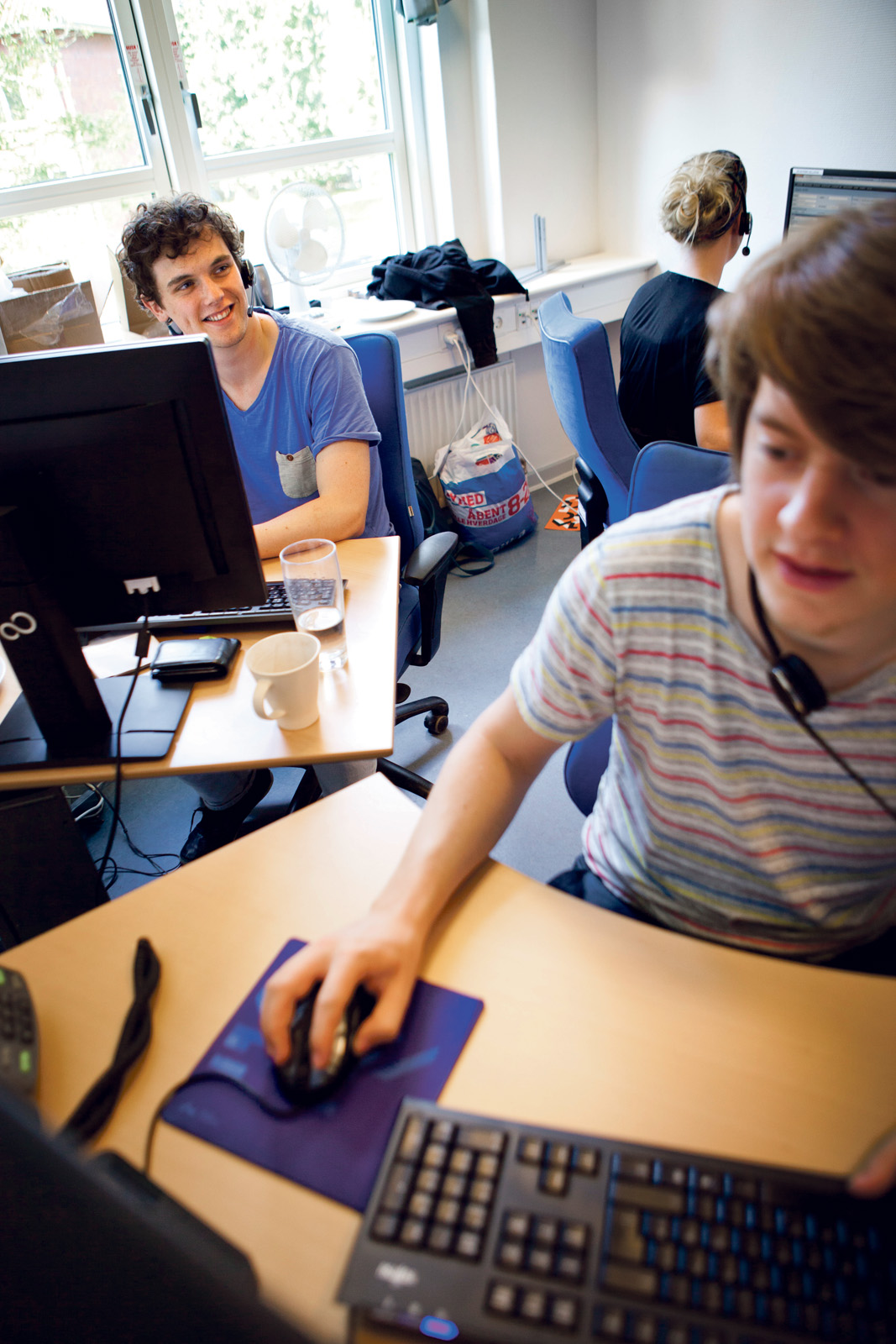A visit to the front line in the IT trenches
Who’s in the front line when the university has IT problems? The staff of the AU IT helpdesk, who offer service facilities to both staff and students. UNIvers has visited three students to see the faces behind the voices you hear on the phone when you call for help. It turned out to be what they regarded as a surprisingly quiet Friday afternoon.

“AU IT, Daniel speaking”.
Normally this would be used as a one-man office, so the three desks are crammed in so tightly that the people who work here can’t even push their office chairs backwards without warning the other two first.
There are no telephones ringing – instead, there are small red lights that come on every time a user needs IT assistance. They might need help with anything from forgotten passwords to systems that are not behaving as they should.
The helpdesk for students at Arts and the joint administrative staff has an ironic phone number: 50 911. As the last three digits indicate, what people need when they ring this number is first aid for their computers.
“What do people call us about? It’s mostly login problems. Forgotten passwords, hardware that isn’t working,” explains Daniel Fly, who is studying computer science and is one of the three student assistants working at the AU IT helpdesk this particular Friday afternoon. The two others join in almost immediately.
“Administrative programs that aren’t working properly. Outlook, everything under the sun. Somebody called me earlier today to ask for the code to get a discount at the local fitness centre! People don’t always notice the word ‘IT’ in ‘AU IT helpdesk’, so they call us with all kinds of problems. But we actually did manage to find the code they wanted on Google,” explains Bodil Hestbæk, who is studying marketing and management communication, before the phone rings again.
“We don’t know everything, but we are prepared to try and find all the answers we can,” adds Emil Gram, who is studying IT.
“Your password is working again. Just try testing it.”
At peak periods (the start of a new academic year, for instance) there are about 235 new inquiries sent by email every day, with the phone ringing even more often than that. And this particular helpdesk only covers Arts and the administration offices. The three other main academic areas have their own phone lines.
“Time flies when you’re busy, but it’s nice when the phone goes a bit quiet because it gives you the chance to get to the bottom of your piles of email,” explains Emil Gram.
Bodil Hestbæk, who has just sent a student off with a new password, explains that it is sometimes hard to get home from a busy day at the helpdesk.
“We work really hard all day long under extreme pressure, and if there are general IT problems it’s hard to help all our users satisfactorily. You just have to take each assignment one at a time even though you know there are loads of people waiting.”
“How many inquiries did we have when we started today? 310? We’re down to 285 now.”
Emil Gram puts down the phone and turns to the other IT supporters pointing proudly at his screen. This is where all the email inquiries can be seen, with the most recent starting off at the end of the queue while the oldest are solved or sent for further processing by the three students in the breaks between phone calls.
Emil Gram explains that people are surprisingly patient when they contact the helpdesk by mail or phone, even though things have been overwhelmingly busy in recent weeks.
“Everyone knows that the semester has just started and that people have been moving offices, and that everything takes a bit longer as a result. Most of the people who contact us are actually really nice,” he says.
And even though they’re sitting in the front line of the IT trenches, the three students love their job, explains Bodil Hestbæk, while Daniel Fly is helping an international student to work out how to use FirstClass and Emil Gram is on the phone helping to get a projector connected to the right cables.
“There are plenty of challenges all day long. It’s nice to be able to talk to people and help them out. You’re solving problems – at least most of the time. And that’s a great feeling,” she concludes.
IT helpdesks at AU
There are a number of helpdesks at the four main academic areas to help staff and students with IT problems relating to the university’s systems, telephones and computers. Unfortunately, they can’t help you with your own personal computer equipment.
It’s a good idea to check driftstatus.au.dk before calling because your problem may already have been reported.
For more information about the university’s IT assistance for students, please go to studerende.au.dk/selvbetjening/it-support-paa-au/, where you will also find the address and phone number of the relevant helpdesk for you.
